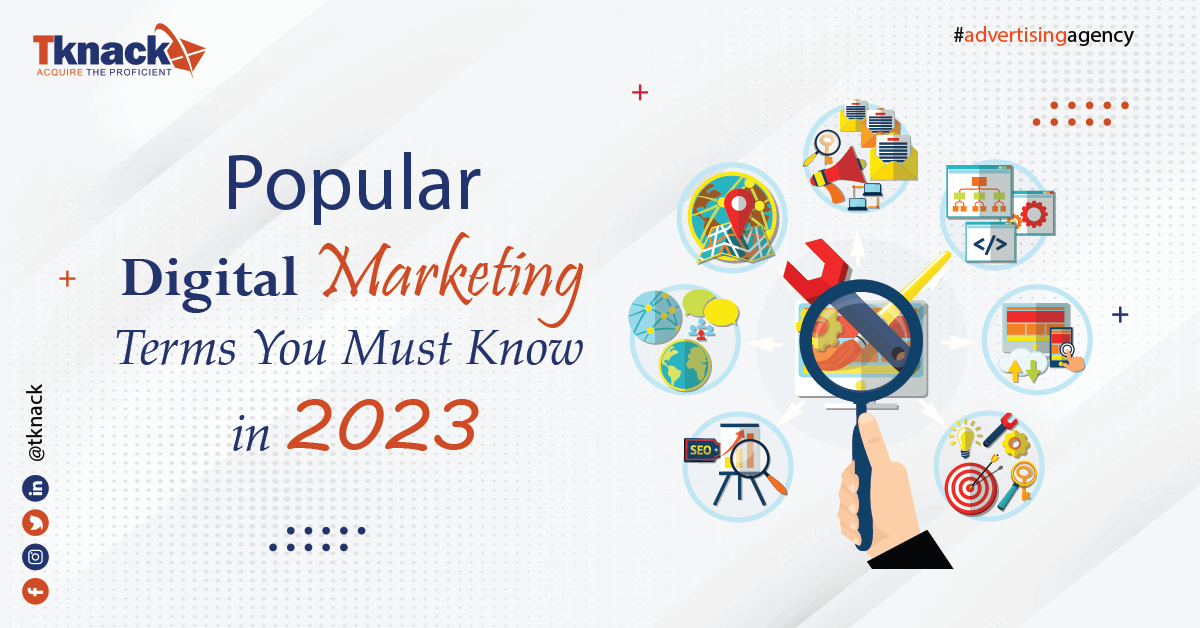As technology evolves and consumer behaviors change, new digital marketing terms emerge, shaping how businesses engage with their target audience. By familiarizing yourself with these terms, you can stay ahead of the competition and effectively navigate the ever-changing digital landscape.
These terms encompass various strategies, techniques, and tools that empower marketers to connect with their audience, drive conversions, and build brand loyalty. By keeping up with the latest digital marketing terms, you can harness the full potential of digital channels, stay relevant in your industry, and propel your business forward in the digital era.
Search Engine Optimization (SEO)
Search Engine Optimization (SEO) is a fundamental aspect of digital marketing, focusing on optimizing websites to rank higher in search engine results. In 2023, several key SEO terms are gaining prominence:
Core Web Vitals: Core Web Vitals refer to specific website performance metrics, such as loading speed, interactivity, and visual stability. Google now considers these factors when determining search rankings, making Core Web Vitals a crucial aspect of SEO.
E-A-T (Expertise, Authoritativeness, Trustworthiness): E-A-T is a framework used by search engines to evaluate the quality and credibility of a website’s content. Building expertise, authoritativeness, and trustworthiness in your content are essential for SEO success.
Voice Search Optimization: With the increasing popularity of voice assistants like Siri and Alexa, optimizing your content for voice search queries is essential. Voice search optimization involves tailoring your content to match the natural language and long-tail keyword phrases.
Mobile Optimization: Mobile optimization is crucial for SEO as mobile devices continue to dominate internet usage. Ensuring your website is mobile-friendly and provides a seamless user experience on smartphones and tablets is vital.
Schema Markup: Schema markup is structured data added to web pages, providing search engines with additional context about the content. Implementing schema markup can enhance search engine visibility and improve the appearance of your website’s search results.

Content Marketing
Content marketing focuses on user-generated Content (UGC), Interactive Content, Content Clusters, Video Marketing, and Influencer Collaboration. These terms can enhance your content strategy and resonate with your target audience. creating and distributing valuable and relevant content to attract and engage a target audience.
User-Generated Content (UGC): UGC refers to content created by users, such as customer reviews, social media posts, and testimonials. Leveraging UGC can help build trust, authenticity, and social proof around your brand.
Interactive Content: Interactive content encourages active engagement from users, increasing their time spent on your website and enhancing brand interaction. Examples include quizzes, polls, calculators, and interactive videos.
Content Clusters: Content clusters involve creating a pillar piece of comprehensive content and linking related articles or blog posts. This approach helps search engines understand the topical relevance of your content and boosts organic rankings.
Video Marketing: Video continues to dominate as a preferred content format. Video marketing involves creating compelling videos to convey your brand message, engage your audience, and increase conversion rates.
Influencer Collaboration: Partnering with influencers with a significant following and influence in your niche can amplify your brand’s reach and credibility. Influencer collaboration involves leveraging the influencers’ audience to promote your products or services.

Social Media Marketing
Social Media Marketing has become an indispensable part of any digital marketing strategy. To navigate the dynamic landscape of social media platforms in 2023, familiarizing yourself with relevant digital marketing terms is essential.
Social Commerce: Social commerce sells products or services directly on social media platforms. With features like shoppable posts and integrated checkout options, social commerce streamlines the purchase process, enhancing conversion rates.
Influencer Marketing: Influencer marketing involves collaborating with influencers to promote your brand, products, or services. Influencers can sway their followers’ opinions and drive significant traffic and conversions for your business.
Social Listening: Social listening involves monitoring and analyzing social media conversations and mentions about your brand, competitors, or industry. This helps you gain insights, identify trends, and engage in meaningful conversations with your audience.
Augmented Reality (AR) Filters: AR filters on platforms like Instagram and Snapchat provide users with an interactive and immersive experience. Leveraging AR filters in social media campaigns can enhance brand visibility and user engagement.
Social Media Stories: Stories have become popular across social media platforms. Posting ephemeral content on platforms like Instagram, Facebook, and Snapchat allows for real-time updates and behind-the-scenes glimpses and fosters a sense of urgency among your audience.

Email Marketing
Email Marketing continues to be a highly effective channel for nurturing leads and driving conversions. To maximize the impact of your email campaigns in 2023, understanding the latest digital marketing terms within email marketing is crucial. Personalization, Automated Drip Campaigns, List Segmentation, Email Automation, and Interactive Emails are terms that can help you deliver targeted and engaging email content to your subscribers.
Personalization: Personalizing your email campaigns involves tailoring content, offers, and recommendations based on the recipient’s preferences, behaviors, and demographics. Personalized emails have higher open rates and conversions.
Automated Drip Campaigns: Drip campaigns are automated email sequences sent to subscribers based on predefined triggers or actions. They allow for targeted and timely communication, nurturing leads throughout the buyer’s journey.
List Segmentation: List segmentation involves categorizing your email subscribers based on specific criteria, such as demographics, preferences, or purchase history. Sending targeted emails to segmented lists increases relevancy and engagement.
Email Automation: Email automation refers to setting up automated workflows that trigger specific emails based on user actions or predefined conditions. Automation streamlines your email marketing efforts, saving time and increasing efficiency.
Interactive Emails: Interactive emails go beyond static content by incorporating elements like surveys, quizzes, GIFs, and embedded videos. Interactive emails enhance user engagement, leading to higher click-through rates and conversions.

Pay-Per-Click (PPC) Advertising
PPC advertising enables businesses to display ads across various online platforms and pay only when a user clicks on the ad. Responsive Search Ads, Audience Targeting, Retargeting, Conversion Tracking, and Ad Extensions are vital terms that can help you refine your PPC campaigns, increase click-through rates, and maximize your return on investment (ROI).
Programmatic Advertising: Programmatic advertising uses AI and algorithms to automate ad buying and placement. It allows for real-time bidding and precise targeting, optimizing ad delivery and increasing campaign efficiency.
Cross-Channel Advertising: Cross-channel advertising refers to running integrated ad campaigns across multiple channels, such as search engines, social media platforms, and display networks. This approach ensures consistent messaging and broader audience reach.
Ad Retargeting: Ad retargeting involves displaying ads to users who have previously visited your website or shown interest in your products or services. Retargeting campaigns can re-engage potential customers and drive conversions.
Dynamic Search Ads: Dynamic search ads automatically generate ad headlines and landing page URLs based on the user’s search query. This dynamic approach allows for more relevant and personalized ad experiences.
Audience Targeting: Audience targeting involves segmenting your target audience based on various factors like demographics, interests, and behaviors. You can optimize your PPC campaigns and improve ad performance by targeting specific audience segments.
Analytics and Data
Analytics and data provide invaluable insights into consumer behavior, campaign performance, and overall marketing effectiveness.
Customer Data Platform (CDP): A Customer Data Platform collects and unifies customer data from various sources, such as websites, apps, and CRMs. CDPs enable a holistic view of customers, facilitating personalized marketing experiences.
Predictive Analytics: Predictive analytics leverages historical data and statistical algorithms to forecast future outcomes and trends. Predictive analytics helps optimize marketing strategies for better results by analyzing patterns and customer behavior.
Data Visualization: Data visualization involves presenting complex data and insights in a visual format, such as charts, graphs, and dashboards. Visualizing data makes it easier to understand and draw actionable conclusions.
Conversion Rate Optimization (CRO): CRO focuses on improving the percentage of website visitors who take desired actions, such as purchasing or filling out a form. CRO enhances website performance and increases conversions by analyzing user behavior, conducting A/B tests, and implementing changes.
Attribution Modeling: Attribution modeling assigns credit to various marketing channels and touchpoints contributing to a conversion. Understanding the most effective channels and touchpoints helps optimize marketing budgets and strategies.

Conversion Rate Optimization (CRO)
Conversion Rate Optimization (CRO) is a vital aspect of digital marketing that focuses on improving the percentage of website visitors who take desired actions, such as purchasing, filling out a form, or subscribing to a newsletter. In order to optimize conversion rates, marketers utilize various tools and strategies. Conversion Rate Optimization (CRO) focuses on maximizing the percentage of website visitors who take a desired action.
Heatmaps: Heatmaps visualize user interactions on your website, providing insights into areas of high engagement, areas of friction, and opportunities for improvement.
Conversion Funnels: Conversion funnels map out users’ steps on your website before converting, helping identify potential drop-off points and optimize the user journey.
Exit Intent Pop-ups: Exit intent pop-ups trigger when a user shows intent to leave your website, providing last-minute offers or incentives to encourage them to stay or convert.
Personalization: Delivering personalized experiences based on user preferences, behavior, or demographics can significantly increase engagement and conversion rates.
Social Proof: Social proof, such as customer reviews, testimonials, and social media mentions, builds trust and credibility, influencing purchase decisions and boosting conversions.

Influencer Marketing
Influencer marketing leverages the reach and influence of individuals on social media to promote products or services. Influencer marketing has emerged as a robust digital marketing strategy, leveraging individuals’ influence and reach to promote products or services. One popular trend in influencer marketing is using micro-influencers, who have smaller but highly engaged audiences. These influencers often specialize in specific niches, enabling brands to target a more focused and relevant audience.
Micro-Influencers: Micro-influencers have smaller, more niche followings but often possess higher engagement rates and authentic connections with their audiences.
Nano-Influencers: Nano-influencers have even smaller followings but are highly influential within their specific communities, making them valuable for targeted marketing efforts.
Authenticity and Transparency: Authenticity and transparency are key factors in successful influencer marketing, with audiences responding positively to genuine and transparent partnerships.
Long-Term Collaborations: Building long-term relationships with influencers fosters brand loyalty and allows for more integrated and authentic content creation.
Compliance and Disclosure: Adhering to legal and ethical guidelines regarding influencer partnerships and disclosure ensures transparency and protects the brand’s reputation.

Artificial Intelligence (AI) in Marketing
Artificial Intelligence (AI) revolutionizes marketing by enabling advanced automation and personalization. Chatbots, powered by AI, are virtual assistants that engage with customers in real-time, answering their queries, providing recommendations, and even facilitating transactions.
Natural Language Processing (NLP), a subset of AI, enables systems to understand and interpret human language, making communication between brands and consumers more seamless. Predictive personalization is another important application of AI in marketing, where algorithms analyze vast amounts of data to deliver tailored messages and offers to individual customers.
Automated customer service is enhanced through AI, as it can efficiently handle inquiries and resolve simple issues. Sentiment analysis uses AI to analyze customer sentiment expressed through reviews, social media posts, or customer feedback, helping brands make data-driven decisions and improve customer satisfaction. Understanding and leveraging these digital marketing terms related to AI can significantly enhance marketing strategies and customer engagement.

Conclusion
As digital marketing continues to evolve, staying updated with the latest terms and trends is essential for success. By familiarizing yourself with these popular digital marketing terms in 2023, you can enhance your strategies, engage your audience effectively, and drive better results. Embrace these terms as opportunities to refine your approach and leverage the ever-expanding possibilities of the digital marketing landscape.
Read Also: Why B2B Digital Marketing strategies are essential for businesses
A digital marketing term refers to a specific word or phrase used in the context of digital marketing strategies, techniques, and technologies. These terms encapsulate the various elements and concepts that professionals in the digital marketing industry employ to promote products or services online. They serve as a common language and understanding among marketers, allowing them to communicate and implement effective digital marketing strategies.
Digital marketing terms play a crucial role in shaping and optimizing marketing campaigns. By understanding and utilizing these terms, marketers can leverage specific strategies and tactics to reach their target audience, increase brand visibility, and drive desired actions. For example, implementing search engine optimization (SEO) techniques as a digital marketing term can improve website visibility in search engine results, driving organic traffic and enhancing campaign performance.
Yes, digital marketing terms continually evolve due to rapid technological advancements, consumer behavior, and industry trends. New words are coined to describe emerging platforms, tools, and emerging strategies. Staying updated with the latest digital marketing terms is crucial to ensure marketers know the most effective and innovative approaches to reach and engage their target audience.
Understanding digital marketing terms can benefit your business in several ways. Firstly, it allows you to communicate effectively with marketing professionals, agencies, or team members, ensuring everyone is on the same page when discussing strategies and objectives. Additionally, being knowledgeable about digital marketing terms enables you to make informed decisions regarding the implementation of specific tactics or technologies, maximizing the impact of your marketing efforts and driving better results.
Several digital marketing terms are essential for email marketing success. Terms like segmentation, automation, interactive emails, and personalization all contribute to creating highly targeted and engaging email campaigns. By leveraging these terms, you can send tailored content to specific audience segments, automate repetitive tasks, enhance user experience through interactive elements, and deliver personalized messages that resonate with your subscribers, ultimately improving the effectiveness of your email marketing strategy.
Digital marketing terms have a significant impact on PPC advertising strategies. Terms like programmatic advertising, ad retargeting, and audience targeting shape how marketers optimize their ad campaigns and target specific audiences. For example, programmatic advertising as a digital marketing term allows marketers to automate ad-buying, ensuring ads are served to the most relevant audiences in real-time. Ad retargeting enables you to display targeted ads to users who have previously interacted with your website, increasing the chances of conversion.
Digital marketing terms play a crucial role in analytics and data-driven decision-making. Terms such as customer data platform (CDP), predictive analytics, and attribution modeling empower marketers to collect, analyze, and interpret data to gain insights and make informed decisions. Leveraging these terms, marketers can centralize customer data, forecast future outcomes based on historical data, and attribute credit to different marketing touchpoints, enabling them to allocate resources effectively, measure campaign performance accurately, and optimize their overall marketing strategy.
You can explore online resources, such as industry blogs, eBooks, and guides, to learn digital marketing terms. Additionally, you can enroll in online courses or attend webinars and workshops focusing on digital marketing. Networking with professionals in the field, participating in forums or communities, and following industry experts on social media platforms can also help you stay informed about the latest digital marketing terms.





Pingback: Boost Your Business with HVAC Digital Marketing Strategies - Digital Marketing Agency in Islamabad-Pakistan
Pingback: Unlocking Global Markets: A Guide to Multilingual Content Marketing - Digital Marketing Agency in Islamabad-Pakistan
Pingback: Pinterest virtual assistant: Enhancing Your Strategy - Digital Marketing Agency in Islamabad-Pakistan